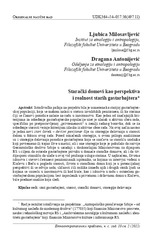| dc.creator | Milosavljević, Ljubica | |
| dc.creator | Antonijević, Dragana | |
| dc.date.accessioned | 2021-10-12T12:14:07Z | |
| dc.date.available | 2021-10-12T12:14:07Z | |
| dc.date.issued | 2015 | |
| dc.identifier.issn | 0353-1589 | |
| dc.identifier.uri | http://reff.f.bg.ac.rs/handle/123456789/2077 | |
| dc.description.abstract | The aim of this paper is to present the results of research conducted as part of the, Ambivalent nostalgia in the cultural heritage of gastarbeiters" project of the Ethnological-anthropological society of Serbia. The research was conducted in Kucevo and Wienna in 2014. The research focused on older guest workers or gastarbeiters who are mostly in the status of disabled pensioners, and seniors whose family members work abroad. An important criterion for determining the gasterbeiter population was entering into the sphere of work in an active capacity, specified by the assumed, "temporality" in the country of work; the determination of, "seniority" is based on the criteria of exiting the active sphere of work. In this way a new kind of old person, a new kind of pensioner was formed - the foreign currency pensioner whose operating strategies are partly in the focus of this paper. Aside from these strategies, the paper analyzes the strategies employed by the family members of gastarbeiters facing the old age of their relatives who reside in their country of origin either permanently or on a semi-permanent basis; as well as the strategies which the Gerontological Society of Serbia tried to develop in cooperation with the former Ministry of Diaspora RS with the aim of attracting aging gastarbeiters to domestic nursing homes, as well as stimulating the diaspora to invest in such institutions in Serbia. In short, the life experiences and attitudes of 14 pensioners interviewed in Kucevo and Vienna on issues of old age, possible - or ongoing life in a nursing home, the differences and/or similarities between them and other old folks they encountered abroad or at home, as well as experiences with working with the aging gastarbeiter population shared by six employees in a private as well as a public nursing home in Kucevo, will be the object of analysis in this paper. | en |
| dc.publisher | Univerzitet u Beogradu - Filozofski fakultet - Odeljenje za etnologiju i antropologiju, Beograd | |
| dc.relation | info:eu-repo/grantAgreement/MESTD/Basic Research (BR or ON)/177026/RS// | |
| dc.relation | info:eu-repo/grantAgreement/MESTD/Basic Research (BR or ON)/177035/RS// | |
| dc.rights | openAccess | |
| dc.rights.uri | https://creativecommons.org/licenses/by/4.0/ | |
| dc.source | Etnoantropološki problemi | |
| dc.subject | operating strategies | en |
| dc.subject | old age | en |
| dc.subject | nursing homes | en |
| dc.subject | gastarbeiters | en |
| dc.subject | aging guest workers | en |
| dc.title | Nursing homes as the perspective and reality of guest workers in old age | en |
| dc.type | article | |
| dc.rights.license | BY | |
| dc.citation.epage | 355 | |
| dc.citation.issue | 2 | |
| dc.citation.other | 10(2): 333-355 | |
| dc.citation.rank | M24 | |
| dc.citation.spage | 333 | |
| dc.citation.volume | 10 | |
| dc.identifier.doi | 10.21301/eap.v10i2.3 | |
| dc.identifier.fulltext | http://reff.f.bg.ac.rs/bitstream/id/873/2074.pdf | |
| dc.identifier.wos | 000436256600003 | |
| dc.type.version | publishedVersion | |

